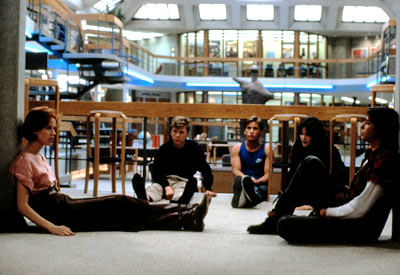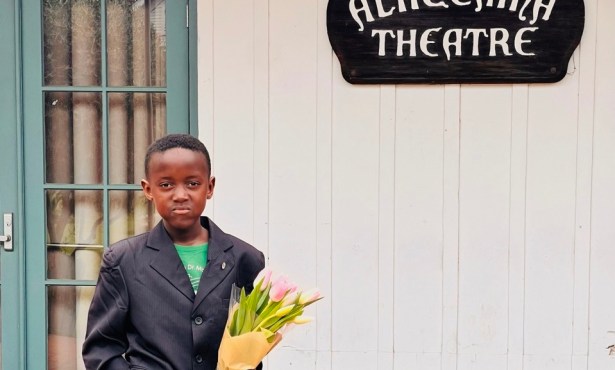Sloane Tanen on Working with Director John Hughes as a Teen
New York Writer Draws from High School Experiences in, Are You Going to Kiss Me Now?
Director and scriptwriter John Hughes’s iconic high school films “never felt like the type of movies an adult made,” Sloane Tanen, writer and former confidante to Hughes, said. Tanen was just a 13-year-old when she started working with Hughes, initially as a test audience for clips from Sixteen Candles, Hughes’s directorial debut. She described watching the scene with Farmer Ted (Anthony Michael Hall) and Sam (Molly Ringwald) in the auto shop classroom during the school dance. “I was crying, I was laughing so hard,” Tanen said.
Over the next two and half years, Tanen said, Hughes would periodically call and ask her various questions about her life, which provided firsthand insight and perspective into the development of his films. “He was young at heart,” Tanen said. “Because he observed the world that way, he related to people that way — he was aware of what was going on. He was way ahead of the curve on so many things.”

Crafting memorable characters, each with distinctive quirks—think John Bender from The Breakfast Club and Duckie from Pretty in Pink—helped distinguish Hughes’s cultural permanence and influence on later generations. Hughes is arguably best known for his depiction of high school archetypes, to which Tanen ascribed the director’s ability to “break the mold” and “do something unexpected.”
Tanen is a New York-based writer who holds her bachelor’s degree from Sarah Lawrence College and graduate degrees from NYU and Columbia University. She recently released Are You Going to Kiss Me Now?, a young adult novel about teenagers that pulls influence from The Breakfast Club.
How did you meet John Hughes?
He wrote many of the movies my dad [Ned Tanen, former president of Universal Pictures and Paramount Pictures] produced in the 1980s. He was at our house sometimes.
How do you remember your time with Hughes?
I mean, we really didn’t spend all that much time together. My relationship with him was mostly over the phone. He lived in Chicago and I lived in L.A. I think I was a kind of guinea pig for him in terms of being an average American teenager. He could run music and art and books by me and would be really interested in my reaction. It was fun to have someone who seemed “important” taking such an interest in my opinions.
What was it like to talk with Hughes?
John was a really good listener. He liked to ask questions and you got the feeling he was really hearing what you had to say. He was funny and intense. He had a lot of energy and was always really excited about new ideas. He was smart and always ahead of the trends. He knew the best music before anybody had heard of it. He knew slang before it reached the mainstream. He just seemed very cool without ever making any kind of effort to be so.

How much of Hughes’s conceptualization of high school was influenced by your stories?
It’s not like I was the inspiration for the movies by any means. He didn’t have his own kids yet, and didn’t know that many kids that age who weren’t famous. I was more or less an average teenager that he had good access to. He would call me, play music and ask, “What do you think of this song?” He was kind of like a kid at heart and had that adolescence and joy. He related really well to younger people. He would bounce ideas off of me. The drawings all over the notebook used in Some Kind of Wonderful were taken from a notebook that I carried. So there were small details from my life used in movies. Not to say I was the inspiration, but he would notice things that most adults don’t and didn’t. He was fun to hang out with because he was so interested. He really wanted to know what I was into and what I liked; who I was dating and how it was going. He was fascinated by female adolescence and insecurity and how that manifested in behavior towards boys.
Hughes named Ferris Bueller’s girlfriend, Sloane Peterson, after you. How did you react when you found out?
I was a regular kid. It was flattering that he picked that character to use my name for. I don’t think I inspired that character. I felt more like the character in Sixteen Candles—jealous of my older sister.
Did Hughes base any characters on you?
I think he put aspects of all the teenagers he met into his characters. I don’t know exactly what bits he took from me. I think many of us recognize ourselves in his characters. He seemed to like my self-deprecating humor. He was interested in my enormous insecurity coupled with my innate sense of self-aggrandizement. He liked that kind of inconsistency and absurdity because it was real and raw.
Did you ever want to go into movie production, directing, or screenwriting yourself?
No.
What is your current profession?
I’m a writer. My latest book, Are You Going to Kiss Me Now? is actually about teenagers. Funnily enough, it’s a kind of Breakfast Club meets Survivor… with famous people.
Do you use any experiences from your adolescence in your own writing?
I don’t think we fundamentally change all that much from adolescence to adulthood. We get more secure and comfortable as we navigate through the world but so many of the events and feelings from high school shape who we are as adults. My first book, Bitter with Baggage Seeks Same, draws heavily from my teenage angst years and the internal anxiety I suffered from being young and so unsure of myself. Many of the humiliating moments from my life and the lives of my friends and family show up in that book and the other books from the series.
Are You Going to Kiss Me Now? doesn’t take any events directly from my own life, but I would say a lot of the characters’ reactions and inner-lives are drawn from my own experience or from the experiences of those I was close to at that time in my life. Reminding myself constantly that the famous characters I was creating are really just teenagers was how I managed to make the celebrities in the book come off as real people.
Why do you think high school is the focus for so many films?
Like I said, much of what happens in high school shapes who we become in later life. I think this is true for some people more than others but the pains and even the victories are so intense at that age. It’s a great forum for films because everything that happens—even the most insignificant events—seem so important. Taking a spill down a hallway can haunt you for years in high school.
What do you think is important about John Hughes’s legacy to future generations?
I don’t think anyone will ever consistently make such poignant, funny, and relatable movies for young people. Each of his movies was very different but they all had one thing in common; a sort of heightened intensity and authenticity that tapped into the adolescent unconscious. John wasn’t trying to make movies to please kids—he was making movies to please himself. I think that’s why they are so good and why they don’t really date or feel pandering. I’m pretty sure they will continue to delight teenagers and adults alike. A good movie is a good movie. And a good teen movie is really hard to pull off. To do it repeatedly speaks mountains about John’s unique talent.



